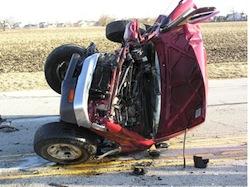- Free Consultation: (630) 527-4177 Tap Here to Call Us
What are Punitive Damages in Illinois?
In the realm of personal injury law, punitive damages hold a unique and significant position. While compensatory damages aim to cover the victim’s actual losses, punitive damages are intended to punish the wrongdoer and deter similar conduct in the future. In Illinois, the awarding of punitive damages follows specific legal guidelines and principles.
What Are Punitive Damages?
Punitive damages, also known as exemplary damages, are monetary awards granted in addition to compensatory damages. These are not meant to compensate the victim for their losses, but to punish the defendant for particularly egregious or reckless behavior and to serve as a deterrent to others.
The Legal Basis for Punitive Damages in Illinois
Under Illinois law, punitive damages are not awarded in every personal injury case. They are reserved for cases where the defendant’s conduct was particularly malicious, willful, or demonstrated a blatant disregard for the safety and rights of others. The Illinois Pattern Jury Instructions define punitive damages as those awarded to punish a defendant or to deter a defendant and others from committing similar acts in the future.
Criteria for Awarding Punitive Damages
For a plaintiff to be awarded punitive damages in Illinois, they must prove the following:
- Intentional Harm or Gross Negligence: The defendant’s actions must go beyond mere negligence. They must show intentional harm or gross negligence that exhibits a willful disregard for the safety of others.
- Clear and Convincing Evidence: The standard of proof for punitive damages is higher than for compensatory damages. The plaintiff must provide clear and convincing evidence of the defendant’s malicious intent or extreme recklessness.
- Public Policy Considerations: Illinois courts also consider the broader implications of awarding punitive damages, including the need to deter similar conduct and the potential impact on the defendant and society at large.

Examples of Conduct Warranting Punitive Damages
Punitive damages are typically awarded in cases involving:
- Fraud or Deceit: When a defendant intentionally deceives the plaintiff, causing harm.
- Intentional Infliction of Emotional Distress: When a defendant’s outrageous conduct intentionally or recklessly causes severe emotional distress.
- Malicious Prosecution: When a defendant initiates a legal action with malice and without probable cause.
- Gross Negligence: When a defendant’s reckless disregard for the safety of others results in significant harm.
Limitations on Punitive Damages
The law imposes certain limitations on the amount of punitive damages that can be awarded. According to the United States Supreme Court’s holding in State Farm Mutual Automobile Insurance Co. v. Campbell, punitive damages should be proportionate to the actual harm suffered by the plaintiff and should consider the reprehensibility of the defendant’s conduct, the disparity between the actual or potential harm suffered by the plaintiff and the punitive damages award, and the difference between the punitive damages awarded and the civil penalties authorized or imposed in comparable cases.
In Illinois, there are no caps or limits on the amount of punitive damages that can be awarded. However, Illinois follows the State Farm v. Campbell ruling and requires that punitive damages not be excessive or disproportionate to the wrong committed by the at-fault party. In fact, the Illinois Supreme Court reduced a punitive damages award to a ratio of 11:1 from an Appellate Court remittitur of 75:1 in International Union of Operating Engineers, Local 150 v. Lowe.
Illinois recently allowed for families to recover punitive damages in Wrongful Death and Survival Act claims. For more information, visit our blog HERE.
Punitive damages play a crucial role in the Illinois legal system by providing a means to punish egregious conduct and deter future wrongdoing. They serve as a powerful tool to uphold justice and ensure that those who exhibit malicious or reckless behavior are held accountable. However, the stringent criteria and limitations imposed by Illinois courts underscore the importance of presenting clear and convincing evidence to support such claims. For those involved in personal injury cases, understanding the intricacies of punitive damages is essential. If you believe your case warrants punitive damages, consulting with an experienced personal injury attorney can help navigate the complexities of the legal system and build a compelling case.
Contact the Illinois Personal Injury Lawyers at John J. Malm & Associates
If you or a loved one has questions about punitive damages arising from a personal injury case, contact the knowledgeable Naperville personal injury attorneys at John J. Malm & Associates.









